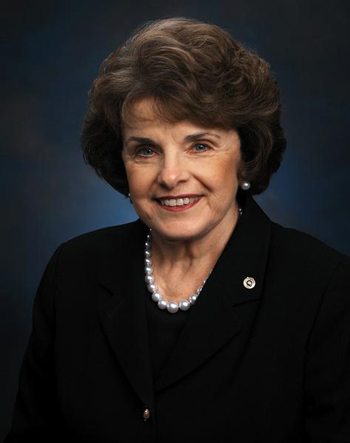September 17, 2020 - Washington - Senator Dianne Feinstein (D-Calif.) on Wednesday spoke before the Senate Energy and Natural Resources  Committee during a hearing to consider the Emergency Wildfire and Public Safety Act.
Committee during a hearing to consider the Emergency Wildfire and Public Safety Act.
This bipartisan bill introduced by Feinstein and Senator Steve Daines (R-Mont.) that would help protect communities from catastrophic wildfires by implementing wildfire mitigation projects, sustaining healthier forests that are more resilient to climate change and providing important energy and retrofitting assistance to businesses and residences to mitigate future risks from wildfire.
Video of the remarks is available here.
“Let me be blunt: California is on fire. Smoke is blanketing the entire western part of the United States, and a good dose of it was here yesterday.
California’s traditional fire season has only just started, but five of California’s 20 largest fires in history have already occurred this year. As I speak, 25 major fires are burning across nearly 2.8 million acres statewide. 25 Californians have died in these fires, 4,200 homes and other structures have been destroyed and more than 42,000 people have been evacuated.
The largest fire in state history is now burning in the Mendocino National Forest; it’s 875,000 acres. All told, 3.2 million acres have burned this year, the most in state history.
And the same is happening across the West. 350,000 acres have burned in Oregon, displacing more than 10 percent of the state’s population. 300,000 acres have burned in Washington. 150,000 in Montana. 100,000 in Colorado.
We have to change our approach to dealing with wildfires and how we manage our forests. We can’t just sit here and do nothing.
Just as an aside, lightning is the source of many of these huge fires. I’ve decided I’m going to make lightening a pursuit. See what I can learn about it and what we might be able to do about it, if anything. Because every year it becomes more and more a source of major fire in the state.
That’s why Senator Daines and I worked for months to draft the bipartisan Emergency Wildfire and Public Safety Act to make some important changes that will help us cope with catastrophic wildfires.
Our bill has the endorsement of California Governor Gavin Newsom, dozens of cities and counties in California and numerous conservation organizations, fire districts and utilities. And I would ask that a list of endorsers be placed in the hearing record.
I’d like briefly to explain three key provisions of the bill.
We have to address the dead and dying trees in our forests that provide fuel for these disasters.
There are more than 150 million dead trees in California’s forests, the result of drought and bark beetle populations that thrive in warmer temperatures.
Our bill creates a $100 million grant program and provides other incentives to help make harvesting dead trees more commercially viable, incentivizing businesses to step in and reduce the fuel load in our forests.
Secondly, we need to increase the use of fire breaks and prescribed burns.
Much like removing dead trees, fire breaks help slow fires and limit their spread.
Our bill would allow for expedited environmental reviews regarding the installation of fire breaks near existing roads, trails, transmission lines and pipelines.
The bill also requires the Forest Service to consult with the Fish and Wildlife Service when new, peer-reviewed research shows that a project could harm threatened or endangered species.
As Senator Wyden has noted, we must also increase the use of prescribed burns that help prevent forests from becoming overgrown and more susceptible to unstoppable fires. Our bill establishes a new Prescribed Fire Center to coordinate research and training of foresters and forest managers in best practices.
And third, we need to do more to help improve resiliency in fire-prone communities.
Our bill expands a key program to aid the retrofit of homes with fireproofing materials in order to prevent the levelling of entire neighborhoods, as we saw in Paradise, California, in 2018.
I went up there and I’ve never seen anything like it. When you see the expanse of fire and how the wind moves fire, how it will catch one block in rural areas and then skip a block, and then the next block, and wipe out half of a commercial area. That’s what happened with one of these huge fires in Paradise in 2018.
We also promote the undergrounding of utility wires to prevent wildfires and the development of distributed energy, such as microgrids, to mitigate the impact of power shutoffs.
Yes, climate change is making these fires worse by the year and we must address it. Our bill takes aim at the direct, most immediate causes of this unprecedented series of wildfires.
I hope this committee will see fit to act swiftly to approve it for consideration by the full Senate.”
Source: Senator Dianne Feinstein








